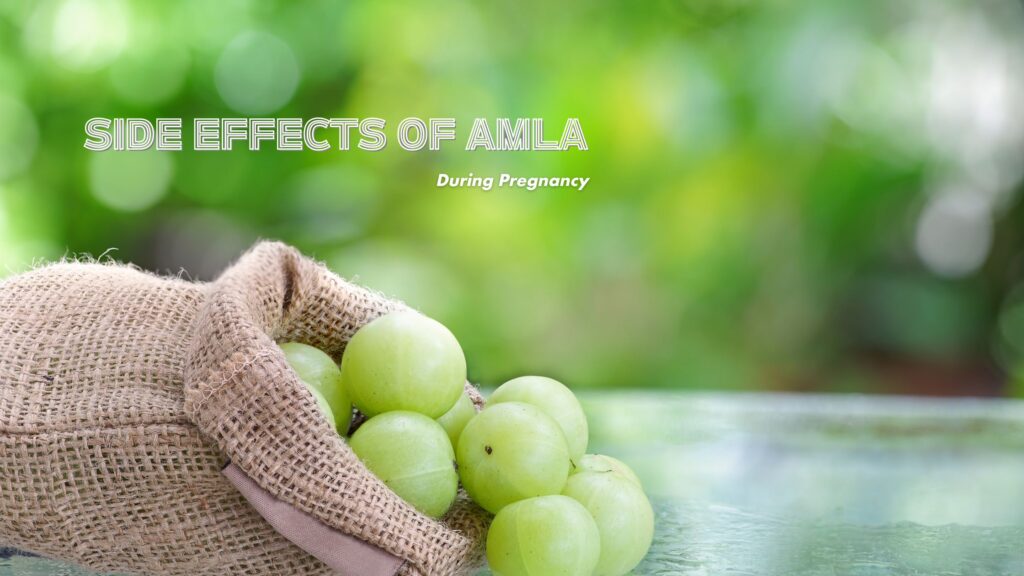Amla is an extremely beneficial fruit for everyone, even during pregnancy. But there are some Side Effects of Amla During pregnancy that you must know about.
Amla, commonly referred to as Phyllanthus emblica, is abundant in Vitamin C, antioxidants, and other essential nutrients. Amla is used in Ayurvedic medicine for its numerous health benefits. But in spite of having numerous health benefits, there are some Side Effects of Amla During pregnancy that we must know about. In this article, we will discuss the Side Effects of Amla During Pregnancy and all the related information. So go through it.
What is amla?

Amla, or “Phyllanthus emblica,” is a fruit that comes from the Indian subcontinent. Small and round, amla has a light-green to yellowish color. It tastes acidic and a little bitter. Amla is used in Ayurvedic medicine for its numerous health benefits. It contains Vitamin C, antioxidants, and other essential nutrients. It also helps to improve hair and skin texture, so it is used in beauty products as well.
Benefits of Amla
There are many health benefits of amla; They are:
Boosting Immunity: Amla is a rich source of Vitamin C, which helps to improve the immune system. If you consume it daily, it will grow your immunity and help you to fight against different diseases and infections.
Improving Digestion: Amla’s high fiber content promotes healthy digestion by encouraging regular bowel movements and reducing constipation.
Managing Blood Sugar: Amla includes chemicals that may aid in blood sugar regulation. Controlled Amla consumption may be good for pregnant women suffering from gestational diabetes.
Nourishing Skin and Hair: Amla’s antioxidants promote skin health by combating free radicals and increasing collagen formation. Amla is good for hair and skin, improves skin conditions, and helps nourish hair and reduce hair loss.
Heart Health: Amla’s antioxidant and anti-inflammatory qualities are thought to benefit heart health by lowering the risk of heart disease.
Anti-Inflammatory Properties: Amla contains anti-inflammatory chemicals that may be useful in controlling inflammation-related discomfort.
Aiding Respiratory Health: Amla’s anti-inflammatory and immunity-boosting characteristics may aid in the maintenance of respiratory health, which is important during pregnancy because susceptibility to respiratory infections increases.
Benefits of Amla during Pregnancy

Vitamin C Boost:
Amla’s Vitamin C content can aid in preserving overall health during pregnancy, when the immune system may be significantly impaired.
Iron Absorption:
Amla contains vitamin C, which aids in the absorption of non-heme iron (plant-based iron) from other meals. It is very important to consume iron during pregnancy.
Antioxidant Protection:
Amla’s antioxidants prevent oxidative stress, which might be enhanced during pregnancy due to increased metabolic activity.
Digestive Aid:
Pregnancy hormones might cause intestinal distress. Amla contains fiber, which is very helpful in reducing constipation.
Skin Health:
Pregnancy-related hormonal changes might have an impact on skin health. Antioxidants in amla may help maintain a healthy complexion by combating free radical damage.
Potential Blood Sugar Regulation:
According to some research, amla may help control blood sugar levels, which is important for pregnant women who have gestational diabetes.
Support Heart Health:
The antioxidant and anti-inflammatory properties of amla may support cardiovascular health during pregnancy.
Is it safe to eat Amla during Pregnancy?

Although eating amla is safe during pregnancy, some people may face some side effects of Amla during pregnancy, which could be anything, it depends on the individual.
Uterine Contractions: Amla is regarded as a naturally occurring uterine stimulant. Consuming too much can occasionally cause uterine contractions, which could raise the chance of preterm labor. Because of this, pregnant women should refrain from consuming big amounts of amla.
Constipation: Amla’s high fiber content can occasionally result in constipation, accompanying bloating and gas. Careful restraint is advised because pregnancy hormones might already make the digestive tract sensitive.
Acidity: Heartburn and acid reflux, which are frequent during pregnancy, may become worse due to amla’s natural acidity. Before adding Amla to your diet, take into account the potential effects if you’re already predisposed to these illnesses.
Allergic Reactions: Although uncommon, some people may experience adverse reactions to amla. Before introducing amla to your diet if you have never ingested it before, it is advised to perform a tiny patch test.
Side effects of amla during pregnancy

Although amla is safe to consume during pregnancy, some people may face the following side effects:
Uterine Contractions:
Amla is regarded as a naturally occurring uterine stimulant. Consuming too much can occasionally cause uterine contractions, which could raise the chance of preterm labor. Because of this, pregnant women should reduce consuming amla to avoid the risk of Side effects of amla during pregnancy.
Constipation:
Amla’s high fiber content can occasionally result in constipation, accompanying bloating and gas. Careful restraint is advised because pregnancy hormones might already make the digestive tract sensitive. Because of this, pregnant women should reduce consuming amla to avoid the risk of Side effects of amla during pregnancy.
Acidity:
Heartburn and acid reflux, which are frequent during pregnancy, may become worse due to amla’s natural acidity. Because of this, pregnant women should reduce consuming amla to avoid the risk of Side effects of amla during pregnancy.
Allergic Reactions:
Although uncommon, some people may experience adverse reactions to amla. Before introducing amla to your diet, if you have never ingested it before, it is advised to perform a tiny patch test, or consult doctor to avoid the rik of Side effects of amla during pregnancy.
Gastrointestinal Upset:
An upset stomach or nausea may result from some pregnant women being unable to tolerate the tangy, sour flavor of amla. It is advised to consume modarately to avoid the rik of Side effects of amla during pregnancy.
Interaction with Medications:
Pregnant women taking pharmaceuticals should exercise caution because Amla may interact with some medications, reducing their efficacy or safety. So, it is important to consult doctor if you are already going through any medication.
Blood Sugar Levels:
Pregnant women who have gestational diabetes may be concerned about Amla’s ability to control blood sugar levels.
Nutrient Overload:
Amla is rich in nutrients like Vitamin C, but ingesting too much of it may result in unneeded nutrient overload, which could have negative effects on health.
Side effects of amla during Pregnancy first trimester
All these above-mentioned side effects may be caused during the first trimester of pregnancy, so it is better to consume moderately, so that it may not cause Side effects during Pregnancy’s first trimester.
It’s necessary to speak with your doctor first if you’re thinking about including amla in your diet during the first trimester.
Side effects of amla during Pregnancy Second Trimester
Even in the second trimester of the pregnancy, all the above-mentioned side effects may be caused by amla.
For special advice, speak with your doctor before putting amla into your diet during the second trimester. They can advise you on whether Amla is an appropriate supplement by taking into account your particular health situation and any potential hazards.
Amla’s hazards may be a little bit lower than they are during the first trimester because the second trimester is a more steady time in pregnancy. However, to safeguard the health of both the mother and the developing fetus, cautious moderation, expert medical counseling, and monitoring for any negative effects are still necessary.
Side effects of amla during Pregnancy third trimester
Even in the third trimester of the pregnancy, all the above-mentioned side effects may be caused by amla.
It’s important to speak with your doctor before putting amla in your diet as you near the end of your pregnancy. Based on your medical background and present state of health, they can offer tailored advice. Even if there may be a minor reduction in the dangers connected with amla during the third trimester, caution should still be taken, especially given the advanced stage of pregnancy.
Can amla cause miscarriage?
In the early stage of pregnacy of first trimester excessesive intake can cause uterin contraction and thus may cause miscarriage. So it is better to consume modarately any kind of food during pregnancy. Always remember in the crucial stage like pregnancy if you are thinking to incorporate any kind of fruits or veggies or any supplements then must consult a doctor.
How to avoid side effects of Amla during pregnancy?
To minimize the risk of experiencing side effects from consuming Amla, or Indian gooseberry, during pregnancy, it’s important to take certain precautions and make informed choices. Here are some strategies to help you avoid potential side effects:
Consult Your Healthcare Provider: Before making any dietary changes or incorporating new foods like Amla into your pregnancy diet, consult your healthcare provider, to avoid side effects of Amla during pregnancy
Moderation is essential: Consume Amla sparingly. Excessive doses may cause unpleasant responses or uterine contractions. Consume in modaration to avoid side effects of Amla during pregnancy.
Observe Your Body: If this is your first time trying Amla during pregnancy, pay attention to how your body reacts. If you suffer any negative side effects, including as allergic reactions, intestinal discomfort, or irregular contractions, stop using it and notify your healthcare professional, to avoid side effects of Amla during pregnancy
Choose Safe versions: Fresh Amla is generally considered safer than concentrated versions such as Amla pills or extracts when ingested in moderation.
Check for Allergies: If you’ve never eaten Amla before, try completing a little patch test to see if you have any allergic reactions before including it in your diet, to avoid side effects of Amla during pregnancy
Balance with Other Foods: Maintain a diversified and balanced diet. Do not rely only on Amla for any nutrient.
Avoid Excessive Acidity: If you’re already prone to heartburn or acid reflux during pregnancy, avoid Amla’s acidity, to avoid side effects of Amla during pregnancy
Prioritize Professional Advice: Put your healthcare provider’s advice ahead of general recommendations. Making safe selections requires their grasp of your health and pregnancy conditions.
Stay Hydrated: To avoid intestinal discomfort, balance your Amla consumption with adequate water.
Listen to Your Body: If your body reacts poorly to Amla, avoid consuming it. Choose alternative nutrient sources that are appropriate for your pregnancy.
The best time to eat Amla During Pregnancy
The timing of Amla, or Indian gooseberry, consumption during pregnancy can help to minimise potential negative effects while maximising benefits. While there is no universally accepted time for eating Amla during pregnancy, here are some suggestions:
Morning: Consuming Amla on an empty stomach may allow you to absorb its nutrients and possible advantages without interruption from other foods. This is also a time when some pregnant women have less nausea and intestinal problems.
Between Meals: Eating Amla as a mid-morning or afternoon snack, ideally between main meals, can help you avoid potential food interactions and lessen the chance of stomach discomfort.
Before Meals: Because of its acidity, consuming Amla roughly 30 minutes before a meal may help promote digestion and enhance nutritional absorption.
With a Meal: If the acidity of Amla bothers you, eating it alongside a meal can help neutralize its effects on stomach acid.
Refference: TOI
To more about SIDE EFFECTS CLICK HERE
Conclusion
Amla is extreamly beficial for every individuals. Amla is totally safe to consume, even during pregnancy. But overconsumption may cause different health issues. It is always important to understand what your body needs. If you really want to incorporate Amla in your diet during pregnancy, ask a doctor, and always try to consume it moderately to avoid the risk of side effects.
Which is the best time to eat amla during pregnancy?
There is no such time to consume amla during pregnancy. You can consume amla at anytime like morning time in empty stomach, in between meals, with meals or after meals.
Can amla cause miscarriage?
Amla do not cause miscarriage but In the early stage of pregnacy of first trimester excessesive intake can cause uterin contraction and thus may cause miscarriage. So it is better to consume modarately any kind of food during pregnancy. Always remember in the crucial stage like pregnancy if you are thinking to incorporate any kind of fruits or veggies or any supplements then must consult a doctor.
Is it safe to eat Amla during Pregnancy?
Amla is extreamly beficial for every individuals. Amla is totally safe to consume, even during pregnancy. But overconsumption may cause different health issues. It is always important to understand what your body needs. If you really want to incorporate Amla in your diet during pregnancy, ask a doctor, and always try to consume it moderately to avoid the risk of side effects.
What are the side effects of amla during pregnancy?
Uterine Contractions, Constipation, acidity, allergic reaction, Gastrointestinal Upset, interaction of medication

Ayurveda treatment for sinusitis:https://dheemahikumarakom.com/